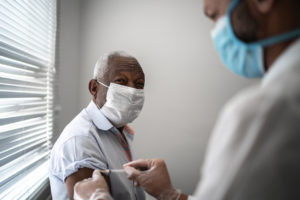The COVID-19 pandemic has changed lives worldwide, and few have been more negatively affected than people in the senior community. The risk of severe illness from COVID-19 increases with age, with 8 out of 10 deaths in the US reported to have been in adults aged 65 or older. Thankfully, COVID-19 vaccines are being rolled out across the country. The arrival of the first COVID-19 vaccines is a major development in the fight against the coronavirus pandemic, but the vaccines have been developed and distributed at unprecedented speed, giving rise to misinformation and myths about their efficacy, side effects, and purpose. So, what do we know about the vaccines, and how can we be sure they are safe? (Spoiler Alert – they are!)
What COVID-19 Vaccines are Available?
At the time of writing, two COVID-19 vaccines have been authorized and recommended by the Centers for Disease Control and Prevention (CDC)—the Pfizer-BioNTech COVID-19 vaccine and the Moderna COVID-19 vaccine. Both vaccines require two shots in the muscle of the upper arm, between 21-28 days apart. Many other COVID-19 vaccines have reached large-scale (Phase 3) trials, too, including vaccines from AstraZeneca, Janssen, and Novavax, so we may see these rolling out shortly.
What are mRNA Vaccines?
Both the Pfizer-BioNTech COVID-19 and Moderna COVID-19 vaccines use a new process known as mRNA (Messenger RNA). Unlike some older vaccine methods, mRNA vaccines don’t contain a live or weakened version of the virus at all. mRNA never enters a cell’s nucleus, and cells break down and remove mRNA quickly. mRNA vaccines teach our immune system about infectious diseases by giving them instructions. From the instruction, our immune system creates a harmless “spike protein” that’s found on the surface of the virus that caused COVID-19. The immune system can now recognize the protein doesn’t belong there and begins making antibodies naturally. Through this method, our bodies learn how to protect against future infection from COVID-19.
How Have the COVID-19 Vaccines Been Tested?
 For a vaccine to be approved in the US, it might go through four stages of safety and effectiveness tests performed by the Food and Drug Administration (FDA). The first stage starts with just 20-100 healthy volunteers, yet by the end of the third stage, the vaccine has been tested on thousands of volunteers. Closely monitored are the safety of the vaccine, its potential side effects, the body’s immune response, and how well the vaccine protects against infection. 25% of the people in the clinical trials for the COVID-19 vaccines were from older age groups, and people with diabetes, obesity, and heart conditions were included in the trials. The fourth stage of the process is continual monitoring of the vaccine to ensure its ongoing safety as it is administered to the public.
For a vaccine to be approved in the US, it might go through four stages of safety and effectiveness tests performed by the Food and Drug Administration (FDA). The first stage starts with just 20-100 healthy volunteers, yet by the end of the third stage, the vaccine has been tested on thousands of volunteers. Closely monitored are the safety of the vaccine, its potential side effects, the body’s immune response, and how well the vaccine protects against infection. 25% of the people in the clinical trials for the COVID-19 vaccines were from older age groups, and people with diabetes, obesity, and heart conditions were included in the trials. The fourth stage of the process is continual monitoring of the vaccine to ensure its ongoing safety as it is administered to the public.
Are COVID-19 Vaccines Safe?
The first COVID-19 vaccines from Moderna and Pfizer have presented no serious safety concerns in trials. These trials have been fully vetted by independent safety monitoring boards. A caveat is that anyone with a history of severe allergic reactions to any injectables (also known as anaphylaxis) should first consult their doctor before getting vaccinated. If you have a history of severe allergic reactions not related to vaccines or injectables (e.g., food, pet, or latex allergies), you should still get vaccinated. Note that the vaccines do not contain egg, preservatives, or latex.
Do the Vaccines Have Side Effects?
You cannot get a COVID-19 infection from a vaccine. None of the vaccines contain the live virus. Vaccines often have short-term, mild side effects as your immune system responds to the vaccine. Around 50% of the people who take the Pfizer vaccine experience mild systemic reactions—headaches, fever, muscle pain, or chills. These last a day or two before dissipating and are not serious or life threatening.
Do COVID-19 Vaccines Work?

All currently available COVID-19 vaccines are highly effective. Both Pfizer and Moderna’s vaccines have been shown to offer around 95% efficacy at preventing COVID-19’s symptoms. The studies show that this efficacy is equal across age groups, races, genders, and ethnic groups. Vaccination can save you from the serious, life-threatening complications of COVID-19 infection. Getting a vaccine for COVID-19 is not just about surviving the virus, either, it’s to prevent the spread of the virus to other people and help stamp out the virus once and for all. No vaccine is 100% effective, but it is significantly safer to get the vaccine than not. You will still need to wear a mask, even if you have received the vaccine. You should also get a COVID-19 vaccination if you’ve previously recovered from COVID-19, as experts are still unsure how long you gain a level of natural immunity from COVID-19 after the initial infection.
Living Life Safely in a Senior Living Community
 The pandemic has resulted in isolation, stress, and worry for many. Conversations with friends in a senior living community can help relieve this stress, and the many fulfilling activities are fantastic for your emotional and physical well-being. Vantage Point offers professional support and assistance so you can enjoy life to its fullest. Routine chores are taken care of for you, with a dedicated maintenance team at your disposal. Our senior living communities serve delicious food so you don’t need to worry about shopping and cooking, either, if you don’t want to. Everyone in our senior living communities is encouraged to get a COVID-19 vaccination and we take additional steps to ensure your health and safety. Visitors are screened for potential COVID-19 symptoms, and we have onsite licensed nursing services to aid you in any medical concerns you may have. We can’t predict what the future will bring, but we can do all we can to enjoy an active, fun, healthy, and safe life. We invite you to connect with Vantage Point today on 610.696.4177 to begin planning your carefree retirement.
The pandemic has resulted in isolation, stress, and worry for many. Conversations with friends in a senior living community can help relieve this stress, and the many fulfilling activities are fantastic for your emotional and physical well-being. Vantage Point offers professional support and assistance so you can enjoy life to its fullest. Routine chores are taken care of for you, with a dedicated maintenance team at your disposal. Our senior living communities serve delicious food so you don’t need to worry about shopping and cooking, either, if you don’t want to. Everyone in our senior living communities is encouraged to get a COVID-19 vaccination and we take additional steps to ensure your health and safety. Visitors are screened for potential COVID-19 symptoms, and we have onsite licensed nursing services to aid you in any medical concerns you may have. We can’t predict what the future will bring, but we can do all we can to enjoy an active, fun, healthy, and safe life. We invite you to connect with Vantage Point today on 610.696.4177 to begin planning your carefree retirement.



